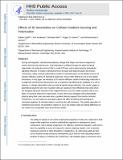Effects of 3D geometries on cellular gradient sensing and polarization
Author(s)
Andasari, Vivi; Zaman, Muhammad H; Spill, Fabian; Mak, Michael; Kamm, Roger Dale
Downloadnihms802371.pdf (733.9Kb)
OPEN_ACCESS_POLICY
Open Access Policy
Creative Commons Attribution-Noncommercial-Share Alike
Terms of use
Metadata
Show full item recordAbstract
During cell migration, cells become polarized, change their shape, and move in response to various internal and external cues. Cell polarization is defined through the spatio-temporal organization of molecules such as PI3K or small GTPases, and is determined by intracellular signaling networks. It results in directional forces through actin polymerization and myosin contractions. Many existing mathematical models of cell polarization are formulated in terms of reaction-diffusion systems of interacting molecules, and are often defined in one or two spatial dimensions. In this paper, we introduce a 3D reaction-diffusion model of interacting molecules in a single cell, and find that cell geometry has an important role affecting the capability of a cell to polarize, or change polarization when an external signal changes direction. Our results suggest a geometrical argument why more roundish cells can repolarize more effectively than cells which are elongated along the direction of the original stimulus, and thus enable roundish cells to turn faster, as has been observed in experiments. On the other hand, elongated cells preferentially polarize along their main axis even when a gradient stimulus appears from another direction. Furthermore, our 3D model can accurately capture the effect of binding and unbinding of important regulators of cell polarization to and from the cell membrane. This spatial separation of membrane and cytosol, not possible to capture in 1D or 2D models, leads to marked differences of our model from comparable lower-dimensional models.
Date issued
2016-06Department
Massachusetts Institute of Technology. Department of Mechanical EngineeringJournal
Physical Biology
Publisher
IOP Publishing
Citation
Spill, Fabian et al. “Effects of 3D Geometries on Cellular Gradient Sensing and Polarization.” Physical Biology 13, 3 (June 2016): 036008 © 2016 IOP Publishing Ltd
Version: Author's final manuscript
ISSN
1478-3975
1478-3967